Aung San of Burma
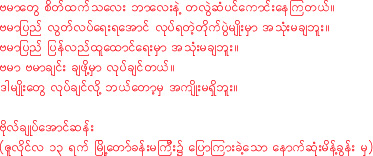
... In so far as nationalism inculcates in us a sense of national and social justice which calls upon us to fight any system that is oppressive or tyrannical both in our country and the world, there I am completely with nationalism. I hate Imperialism whether British or Japanese or Burmese. ...
(From address delivered at a Meeting of the Anglo-Burman Council at the City Hall, Rangoon, on December 8, 1946)
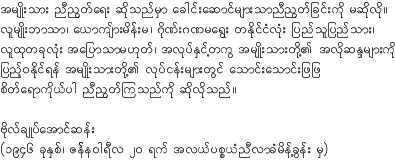
... We cannot bank our hopes on possibilities. We must put our trust in ourselves, in our capabilities and efforts and strength and preparations not only for our success but even to avoid our own defeat. ...
(Presidential Address, AFPFL Supreme Council Session, August 1946)
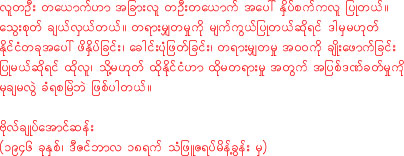
... I am well aware that there is such a great craving in man for heroism and the heroic, and that hero worship forms not a small motif in his complex. I am also aware that, unless man believes in his own heroism and the heroism of others, he cannot achieve much or great things. We must, however, take proper care that we do not make a fetish of this cult of hero-worship, for then we will turn ourselves into votaries of false gods and prophets. ...
(Presidential Address delivered to the first Congress of AFPFL , 20th January, 1946)
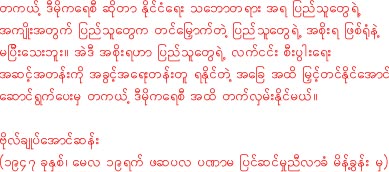
...It is man's creative power and that alone which makes himself, his stars, his history, his Karma, etc., though no doubt he has to take necessarily due account of factors and forces around him. WORK, WORK, WORK, ACTION, ACTION, ACTION, SELF-RELIANCE, SELF-RELIANCE, SELF-RELIANCE This is the stern, simple golden rule of timeless truth for any success that man makes. And there is no other rule which comes first before it. ...
(Presidential Address, AFPFL Supreme Council Session, August, 1946)
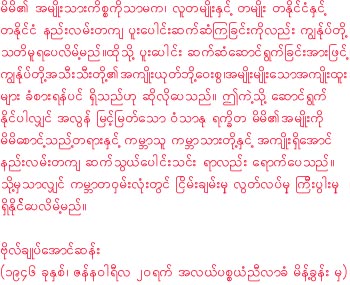
...Internationalism and nationalism, economics and politics, politics and sociology, sociology and culture, religion, ethics etc, are but different parts of the one complex whole, each related to the other, ever changing in form and content. We cannot think, live and move in water-tight compartments only. We cannot keep on holding fixed, rigid dogmas which can no longer be in tune with the spirit of the times. ...
(Presidential Address delivered to the first Congress of AFPFL, 20th January, 1946)
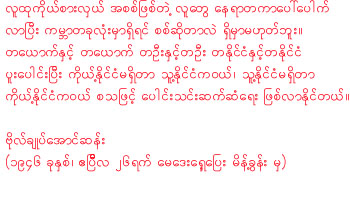
...If (British) Government or we desire really to know the true economic and financial position in the country, it is not by superficial observations such as looking at attendances at a few theatres and cinemas or a crowd of people in a bazaar stall struggling to buy daily necessities which for many have to be severely reduced in amount and kind, just enough for their bare subsistence, but by a deeper and more factual survey that we can hope to get a true picture. ...
(Address delivered to the Second Session of the Supreme Council of AFPFL, 16th May, 1946)
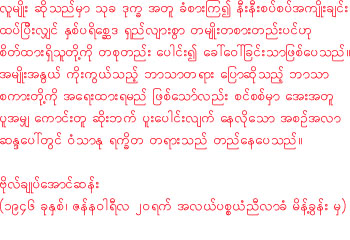
... I say then to you: come and let us do them and achieve them, for it is in our power to make or mar our destiny. Above all, have no doubt about your creative power which can move mountains and even Heaven. And what Heaven on this earth can stand before the united will and wisdom of our people conscious of their strength and power and harnessing it firmly to the chariot wheels of history? ...
(Presidential Address delivered to the first Congress of AFPFL , 20th January, 1946)
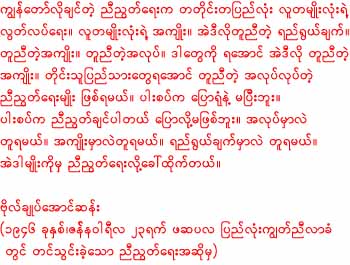
... Nowadays, all the world over, we cannot confine the definition of a nationality to the narrow bounds of race, religion etc, Nations are extending the rights of their respective communities even to others who may not belong to them except by their mere residence amongst them and their determination to live and be with them. ...
(From address delivered at a Meeting of the Anglo-Burman Council at the City Hall, Rangoon, on December 8, 1946)
... As a matter of fact, politics knows no end. It is Samsara in operation before our eyes, the Samsara of cause and effect, of past and present, of present and future which goes round and round and never ends, What cause and what effect, what past and what present, what present and what future hold for us now in politics? We have wars and wars. What cause? What effect? ...
(Presidential Address delivered to the first Congress of AFPFL , 20th January, 1946)
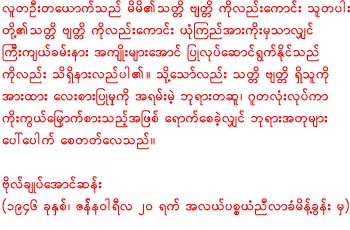
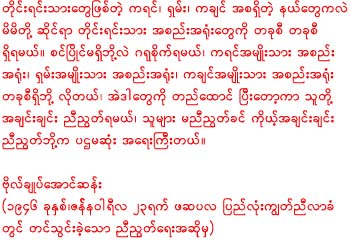
... We too earnestly desire, as indeed cultivators themselves do, to do everything possible to launch an extensive cultivation drive so that we might be able not only to feed ourselves but also the starving millions in the world. ...
(Address delivered to the Second Session of the Supreme Council of AFPFL, 16th May, 1946)

Aung San of Burma
(1915 - 1947)

